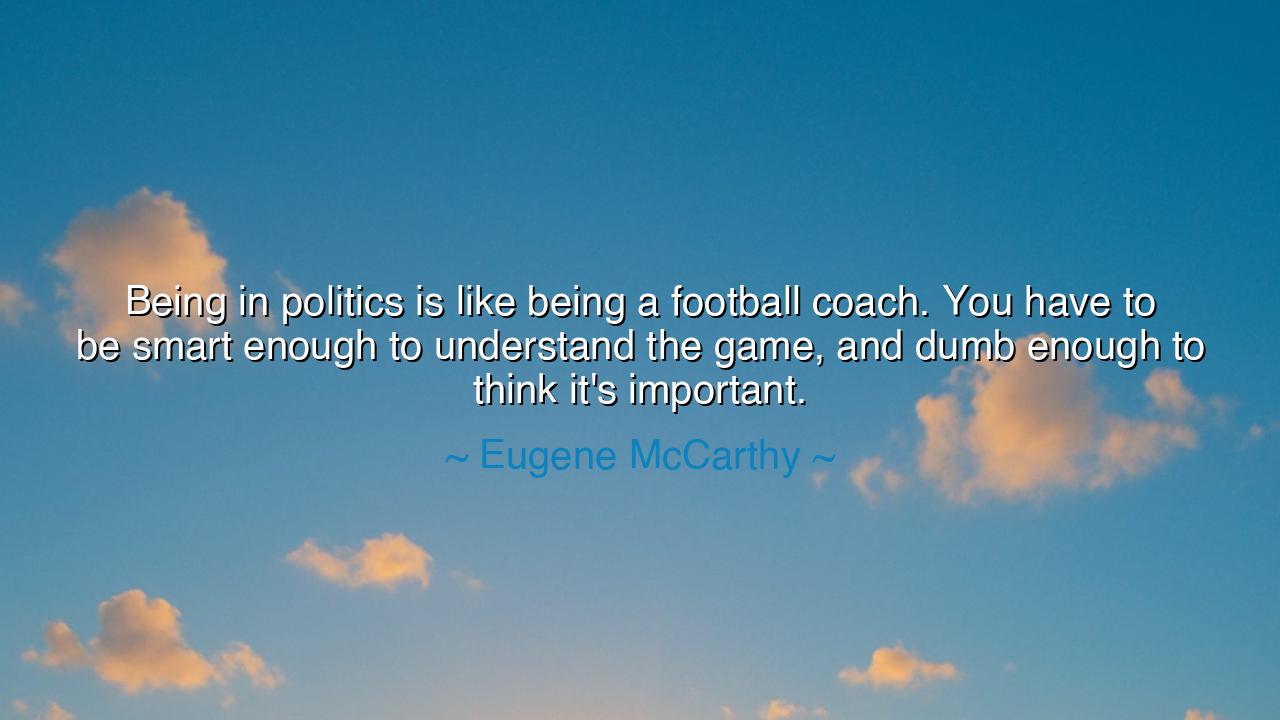
Being in politics is like being a football coach. You have to be
Being in politics is like being a football coach. You have to be smart enough to understand the game, and dumb enough to think it's important.






Eugene McCarthy’s words—"Being in politics is like being a football coach. You have to be smart enough to understand the game, and dumb enough to think it’s important."—speak with the sharp edge of irony and the weight of wisdom. In this saying, he strips the grandeur from politics, comparing it not to divine art or noble battle, but to a game—a contest of strategy, ego, and endurance. To succeed in it, one must possess intelligence enough to master its rules, yet also a kind of blindness, a willingness to treat the game as if it carried the weight of eternity.
At its heart, McCarthy’s teaching is about the paradox of power. To govern requires smartness: the ability to read situations, anticipate moves, and navigate conflict. Yet it also demands a certain dumbness, a willful suspension of perspective, for the contests of politics, though urgent in the moment, often resemble shifting tides rather than eternal truths. The coach believes the game is the world; the politician must often do the same, even if history shows otherwise.
History provides its lesson in Pericles of Athens, who rose to guide his city during its golden age. He was smart enough to harness democracy, diplomacy, and war, yet dumb enough to believe that Athens’s dominance was destined to endure forever. Under his leadership, the city reached unmatched heights of culture and power, yet the Peloponnesian War that followed revealed how fragile the “game” truly was. His wisdom guided Athens, but his devotion to the contest blinded him to its ultimate futility.
McCarthy’s words also carry humor, yet it is a humor that conceals lament. He shows us that politicians, like coaches, often whip crowds into frenzy over contests that may matter less than they appear. They pour out their lives upon the field of struggle, but the world beyond continues, unmoved by their victories and defeats. To call this “dumb” is not insult, but recognition: that to survive in politics, one must embrace the illusion of importance as though it were truth.
Let the generations remember: politics is both vital and vain, both necessary and fleeting. The wise citizen sees it as McCarthy did—respected for its craft, mistrusted for its vanity. To understand the game is intelligence; to treat it as ultimate is folly. And yet, without those who play it with passion, the structures of nations would collapse. Thus, the burden of the politician is to be both smart and dumb—and the burden of the people is to discern which is which.






TQToan quang
McCarthy’s quote about politics being like football coaching suggests that politicians may need a certain level of self-deception to stay motivated. Is this how many politicians survive the pressures of their jobs? By convincing themselves that what they do really matters, despite the often repetitive and superficial nature of political battles? How does this mindset affect the quality of leadership, and does it hinder the ability to focus on more substantive issues?
YNhai yen nguyen
McCarthy’s statement feels like a commentary on the absurdity of politics. His comparison to football coaching implies that politics can sometimes be driven by strategies and egos rather than meaningful progress. Are we, as a society, too focused on the spectacle of politics, rather than real, impactful change? How can we encourage a more genuine and thoughtful political landscape, where the game isn’t treated as more important than the issues it should address?
VLPham Van Loc
This quote makes me think about the nature of politics. McCarthy seems to suggest that politicians need to balance their awareness of the stakes with an almost naive belief in the importance of the game. How often do politicians lose sight of real issues by focusing on maintaining power and popularity? Does this quote suggest that genuine change is difficult in a system where staying in the game can sometimes be more important than the substance of the policies?
TQThu Quyen
McCarthy's comparison of politics to football coaching strikes me as both cynical and realistic. He suggests that you need to be both smart and naïve at the same time to succeed. But is it possible to be truly successful in politics without understanding its complexities? Or does this quote reflect the way politicians often need to ignore the bigger picture in order to keep playing the game and stay in power?
GADo Gia Anh
Eugene McCarthy’s quote about politics being like coaching football is an interesting comparison. It suggests that politicians need both strategic intelligence and the ability to be deeply invested in something that might seem trivial to others. Does this mean that the best politicians are those who understand the stakes without getting caught up in the drama of the game? Or is McCarthy implying that passion, even for things that might seem insignificant, is necessary to succeed in politics?